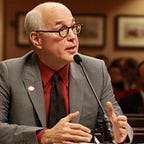Hey President Biden! The Evidence Keeps Piling Up
By Michael Lighty
Whether its recent peer-reviewed studies or the Congressional Budget Office showing the savings generated by Medicare for All, or showing the inadequacies of private health insurance, evidence for the effectiveness of “single-payer” healthcare financing continues to grow.
We hear much these days about following the data and science. Facts matter.
We can quantify the wasted dollars going to unnecessary paperwork, and what that paperwork does: delay and deny care. We know how much money the largest health insurance company diverted from health services last year as profit. And what they paid their CEO as they increased revenue and profit from their contracts with taxpayer funded healthcare programs.
We know a simple truth: we pay for everything in healthcare.
The prescription co-pay that keeps going up is how we pay at the pharmacy.
The raise we didn’t get is how we pay at work.
The $15, $30, or $40 co-pay is how we pay at the doctor’s office.
The $300, $500, $1300 check to the insurance company each month is how we pay at home.
The deductible we put on the credit card, the test we didn’t get, or the pills we cut in half are the risks we take because our insurance doesn’t provide the care we need.
We learn that insurance is great until we really need it, like from a sudden illness or a major accident, then everything gets really expensive, and the insurance doesn’t cover everything.
What it doesn’t cover is what have to pay for. Or owe. Or are never able to pay because no one individual could, so we go bankrupt.
Sometimes our life depends on paying. We’ve seen the GoFund Me pages, we’ve given to or needed it. Cutting the insulin in half, we know what can happen if our luck fails.
We also know that healthcare needs fundamental change or a re-built system. Most of us support Medicare For All as the way to do that, despite the on-going huge special interest campaign against it.
So where should we put all this knowledge to good use?
Winning political victories against the insurance companies and healthcare industry.
The insurance companies and pharmaceutical corporations, and the rest of the healthcare industry use a good-sized amount of their revenue — generated by the premiums we pay — to lobby bi-partisan elected officials and deploy their individual donations and industry PAC monies to fund election campaigns, including presidential campaigns.
It takes a people’s movement to defeat big money. We learned that from history — people power is the only way to overcome money power.
To build that power requires a movement and a champion. It requires a president to make healthcare a top priority, to champion the demand for universal, guaranteed healthcare.
We learned that from history, too. FDR and the labor movement winning Social Security, and during the war the first steps toward universal healthcare; the civil rights movement, labor unions joined by LBJ to win Medicare and Medicaid; President Obama and a movement that demanded far more, winning expansion of Medicaid and closing coverage gaps, saving lives.
The disparaging, dismissive disdain Democratic elites express toward Medicare For All contrasts with the strong foothold it has among rank-and-file Democrats, and independents, and with working class GOPers. Deep pocket donors confuse and sow doubt to protect their bottom lines, and politicians provide cover.
Demolishing that cover, exposing the false choices of plans that do not guarantee healthcare, or control costs, but which instead enrich shareholders and executives, while denying care, reveals an industry that cannot hide the consequences of its greed.
Let’s have a real debate over how we spend our healthcare dollar. 98 cents for healthcare services under Medicare for All, or at best 85 cents (likely 70 cents) relying on private insurance?
But we’re not allowed to have that debate. Instead, the debate is over taxes, how much they go up. Never mind the private tax extracted from us by all those ways we pay — at the pharmacy, work, doctor’s office, and home.
Even though we will spend way less by eliminating the costs of all the unnecessary billing, paperwork and profits, the fake complaint is it costs too much. As every other country with a similar economy knows, financing healthcare universally through progressive taxes costs less and controls costs. And we get way more: Medicare for All covers everything from long-term care at home to dental, medical, mental health, hearing aids, and eyeglasses.
As a current Medicare beneficiary said to me in Iowa: it’s so reasonable, who can argue with that?
